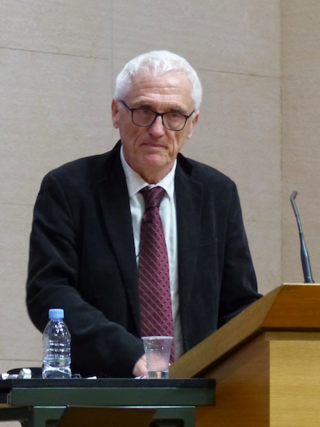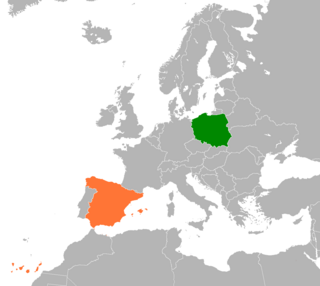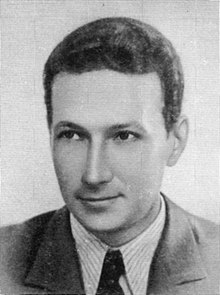
Poland, officially the Republic of Poland, is a country in Central Europe. It is divided into 16 administrative provinces called voivodeships, covering an area of 312,696 km2 (120,733 sq mi). Poland has a population of 38 million and is the fifth-most populous member state of the European Union. Warsaw is the nation's capital and largest metropolis. Other major cities include Kraków, Wrocław, Łódź, Poznań, Gdańsk, and Szczecin.

Polish literature is the literary tradition of Poland. Most Polish literature has been written in the Polish language, though other languages used in Poland over the centuries have also contributed to Polish literary traditions, including Latin, Yiddish, Lithuanian, Russian, German and Esperanto. According to Czesław Miłosz, for centuries Polish literature focused more on drama and poetic self-expression than on fiction. The reasons were manifold but mostly rested on the historical circumstances of the nation. Polish writers typically have had a more profound range of choices to motivate them to write, including past cataclysms of extraordinary violence that swept Poland, but also, Poland's collective incongruities demanding an adequate reaction from the writing communities of any given period.

Roman Stanisław Dmowski was a Polish politician, statesman, and co-founder and chief ideologue of the National Democracy political movement. He saw the Germanization of Polish territories controlled by the German Empire as the major threat to Polish culture and therefore advocated a degree of accommodation with another power that had partitioned Poland, the Russian Empire. He favoured the re-establishment of Polish independence by nonviolent means and supported policies favourable to the Polish middle class. While in Paris during World War I, he was a prominent spokesman for Polish aspirations to the Allies through his Polish National Committee. He was an instrumental figure in the postwar restoration of Poland's independent existence. Throughout most of his life, he was the chief ideological opponent of the Polish military and political leader Józef Piłsudski and of the latter's vision of Poland as a multinational federation against German and Russian imperialism.

John Paul II Catholic University of Lublin is a university established in 1918. It is the only private college in Poland with the status of a university.

The Polish Academy of Arts and Sciences or Polish Academy of Learning, headquartered in Kraków and founded in 1872, is one of two institutions in contemporary Poland having the nature of an academy of sciences.
The culture of Poland is the product of its geography and distinct historical evolution, which is closely connected to an intricate thousand-year history. Polish culture forms an important part of western civilization and the western world, with significant contributions to art, music, philosophy, mathematics, science, politics and literature.

Johann Dzierzon, or Jan Dzierżon or Dzierżoń, also John Dzierzon, was a Polish apiarist who discovered the phenomenon of parthenogenesis in bees.

The University of Lviv, presently the Ivan Franko National University of Lviv, is the oldest institution of higher learning in present-day Ukraine dating from 1661 when John II Casimir, King of Poland, granted it its first royal charter. Over the centuries, it has undergone various transformations, suspensions, and name changes that have reflected the geopolitical complexities of this part of Europe. The present institution can be dated to 1940. It is located in the historic city of Lviv in Lviv Oblast of Western Ukraine.

Jan Tomasz Gross is a Polish-American sociologist and historian. He is the Norman B. Tomlinson '16 and '48 Professor of War and Society, emeritus, and Professor of History, emeritus, at Princeton University.

Feliks Karol Koneczny was a Polish historian, theatrical critic, librarian, journalist and social philosopher. He founded the original system of the comparative science of civilizations.

The All-Polish Youth refers to two inter-linked Polish far-right ultranationalist youth organizations, with a Catholic-nationalist philosophy. Its agenda declares that its aim is "to raise Polish youth in a Catholic and patriotic spirit".

Mateusz Andrzej Piskorski is a far-right Polish politician and publicist.

Józef Jan Gosławski was a Polish sculptor and medallic artist. He was a designer of coins, monuments and medals. Laureate of many artistic competitions; decorated with the Silver Cross of Merit.

The University of Warsaw is a public university in Warsaw, Poland. Established in 1816, it is the largest institution of higher learning in the country offering 37 different fields of study as well as 100 specializations in humanities, technical, and the natural sciences.
The Museum of Polish History or the Polish History Museum is a museum and national cultural institute in Warsaw, Poland. The purpose of the museum is to present the most important events in Polish history, with a particular emphasis on Polish traditions of freedom.

The Museum of the Second World War is a state cultural institution and museum established in 2008 in Gdańsk, Poland, which is devoted to the Second World War. Its exhibits opened in 2017.

The looting of Polish cultural artifacts and industrial infrastructure during World War II was carried out by Nazi Germany and the Soviet Union simultaneously after the invasion of Poland of 1939. A significant portion of Poland's cultural heritage, estimated at about half a million art objects, was plundered by the occupying powers. Catalogued pieces are still occasionally recovered elsewhere in the world and returned to Poland.

Poland–Spain relations are cultural and political relations between Poland and Spain. Both nations are members of NATO, the European Union, OECD, OSCE, the Council of Europe and the United Nations. Spain has given full support to Poland's membership in the European Union and NATO.

Movement of Polish Nationalists Zadruga was a Polish neopagan nationalist movement.

















